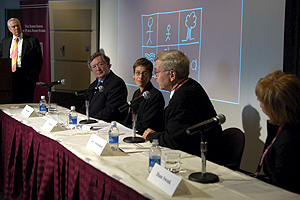Consortium will review study data to identify best investments in children
By William HarmsNews Office
 Bill Kurtis (far left, standing), a documentary host and producer and former news anchor, was the moderator for a panel discussion at the University’s Harris School of Public Policy Studies. Kurtis listens as panelists discuss early childhood development and the best ways to invest in children’s learning so they thrive throughout their lives, while also adding benefits to society. Panelists who participated in the discussion are (from left to right) Craig Ramey, a distinguished health studies professor of Georgetown University; Cybele Raver, Associate Professor in the Harris School of Public Policy Studies and Director of the Center for Human Potential and Public Policy; Larry Schweinhart, president of High/Scope Educational Research Foundation; and Diane Swonk, senior managing director and chief economist for Mesirow Financial. | |
With support from leading philanthropists, economist James Heckman and a research team launched the Pritzker Consortium on Early Childhood Development at an inaugural symposium Monday, May 15 at the Gleacher Center.
The consortium will be based at the Irving B. Harris Graduate School of Public Policy Studies.
Heckman, a Nobel-prize winner and the Henry Schultz Distinguished Service Professor in Economics and the Harris School, said in his opening remarks that investments in early childhood education would improve opportunities for disadvantaged youngsters and also boost productivity for the nation’s workforce.
He noted that in addition to the cognitive skills that children gain by going to preschool, they also gain improved social skills. “Life-cycle skill formation is dynamic in nature. Skill begets skill; motivation begets motivation. If a child is not motivated and stimulated to learn and become engaged, the more likely as an adult he will fail in social and economic life,” Heckman said.
Also speaking at the symposium was Susan Mayer, Dean of the Harris School. She pointed out the importance of the consortium to the work of the school. The Harris School has as part of its mission the preparation of men and women to solve some of society’s most complex problems, including those emerging in the areas of education and family well-being.
Philanthropist J.B. Pritzker, founder of the consortium, said, “Our goal is to identify the most important development opportunities for children 5 years and younger, and to transform the way society and the business community view investments in early childhood education. We owe it to ourselves and our nation to make this a priority now.”
The Children’s Initiative, a project of the J.B. and M.K. Pritzker Family Foundation, provided seed money for the initiative.
Also speaking at the symposium was Illinois’ First Lady Patti Blagojevich, who commented on Gov. Blagojevich’s recently approved universal preschool initiative, which will begin by bringing preschool education to at-risk students in Illinois.
“We know that investments in early childhood education make a real difference in children’s lives. Children who go to preschool are 30 percent more likely to graduate from high school and 41 percent less likely to need special education,” she said.
After the opening remarks, a panel of experts, guided by moderator Bill Kurtis, a documentary host and producer, talked about the challenge of providing high-quality preschool education to children and about the economic impact of the programs.
Joining that discussion were Craig Ramey, distinguished professor of health studies and founding director of the Center for Health and Education at Georgetown University; Cybele Raver, Associate Professor in the Harris School and Director of the Center for Human Potential and Public Policy; Larry Schweinhart, president of High/Scope Educational Research Foundation; and Diane Swonk, senior managing director and chief economist for Mesirow Financial.
The Pritzker Consortium on Early Childhood Development brings together leading experts to identify the best ways to invest in children age 5 and younger in order to realize the largest possible gain for them and society. The consortium will review data from studies worldwide and provide the information to policy-makers, non-profit organizations and the business community.
In addition to Ramey and Schweinhart, other members of the consortium include Gary Becker, University Professor in Economics and the Graduate School of Business, and other leading scholars from around the country.
![[Chronicle]](/images/sidebar_header_oct06.gif)